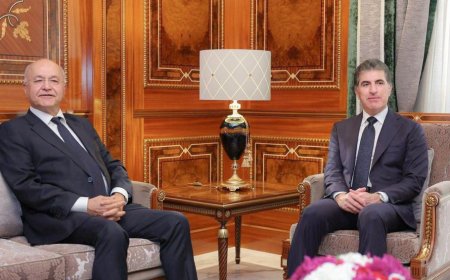EU remembers Yazidi ‘tragedy,’ urges action to support return of displaced

ERBIL, Kurdistan Region - The European Union on Sunday marked the 11th anniversary of the Yazidi “tragedy,” calling for justice and better living conditions for displaced members of the community. The commemoration comes in memory of the brutal campaign launched by the Islamic State (ISIS) against the ethnoreligious minority in 2014.
In a statement, the EU emphasized the “importance of accountability for crimes committed by [ISIS] Da’esh against all victims of their terror,” including the Yazidi community. “We welcome all actions by Iraqi authorities and international efforts to support this accountability,” the statement read.
ISIS captured large parts of northern and western Iraq in mid-2014. In August of that year, the group launched a genocidal assault on the Yazidi community in the Shingal (Sinjar) region. An estimated 5,000 to 10,000 Yazidi men and elderly women were killed, while between 6,000 and 7,000 women and girls were abducted and subjected to sexual slavery and human trafficking. Around 400,000 Yazidis fled, with the majority taking refuge in the Kurdistan Region.
The United Nations has officially recognized the campaign as genocide.
Despite Iraq’s formal declaration of victory over ISIS in 2017, more than 21,000 Yazidi families remain in displacement camps, primarily in the Kurdistan Region’s northern Duhok province. Their return is chiefly hindered by unresolved security concerns and the continued presence of various armed groups in Shingal.
For its part, the EU reaffirmed its support for “Iraq’s unity, sovereignty and territorial integrity,” and emphasized the importance of protecting the country’s ethnic and religious diversity, “of which the Yazidi community is an integral part.”
It further added that despite efforts by the Iraqi government, the Yazidi community “continues to face obstacles preventing them from returning to their homes,” particularly in their ancestral heartland, Shingal. The Yazidis are impeded by “security concerns and limited access to basic social services,” the EU noted.
The EU also urged Baghdad and Erbil to implement the Sinjar Agreement, signed in October 2020 with the backing of the United Nations Assistance Mission for Iraq (UNAMI). The agreement aims to remove non-state armed groups from Sinjar, restore stability, and reestablish local governance. However, nearly five years on, the deal remains unimplemented.
Earlier on Sunday, Kurdistan Region President Nechirvan Barzani called on Baghdad to shoulder full responsibility for the Yazidi heartland’s security and development and “no longer allow Shingal and Yazidi areas to become arenas for militia tensions and armed groups.”
“We stress the importance of implementing the agreement between the Kurdistan Regional Government and the Iraqi federal government to normalize conditions in Shingal,” President Barzani said, referencing the Shingal Agreement.
[Source: Rûdaw English]













/file/attachments/orphans/rebecca-hague-mothers_864112.jpg)






































